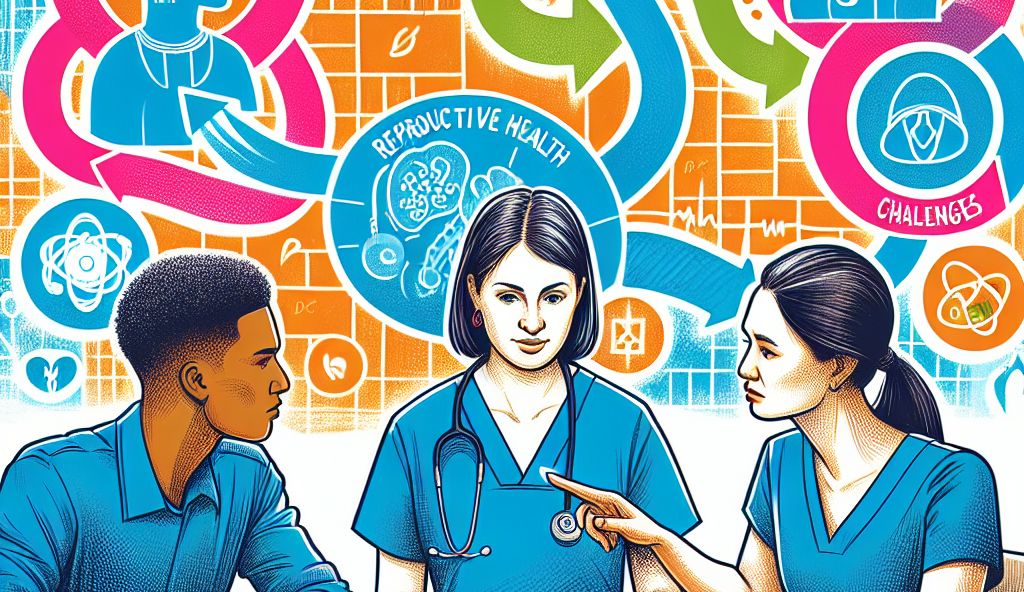Navigating Challenges: The Reproductive Health Nurse Practitioner's Guide

As Reproductive Health Nurse Practitioners (RHNPs), professionals in this field navigate through a complex labyrinth of clinical, ethical, and emotional challenges daily. This role entails not only a broad medical knowledge base and technical skills but also demands a deep understanding of the multifaceted aspects of reproductive health and the sensitivity required to address them.
Clinical Challenges
RHNPs face a variety of clinical challenges that require both expertise and judgment. Given the sensitive nature of reproductive health, NPs must stay current with the latest medical guidelines and research. This includes understanding the nuances of fertility treatments, the management of sexually transmitted infections (STIs), and the provision of family planning services. Moreover, RHNPs frequently encounter patients with diverse cultural and personal beliefs about reproduction, which must be navigated respectfully.
Another clinical challenge is addressing the needs of special populations, such as adolescents or LGBTQ+ individuals, whose reproductive health needs may differ from the general population. This requires specialized knowledge and the ability to advocate for these populations within the healthcare system.
Ethical Challenges
Ethical dilemmas are common in reproductive health due to the personal and often controversial nature of the field. RHNPs must balance respecting patient autonomy with professional guidelines and laws. For example, when dealing with issues such as abortion, assisted reproductive technologies, and contraception, nurse practitioners must navigate patient care within the framework of legal restrictions and moral debates.
Confidentiality is paramount, yet challenging to maintain, especially when dealing with minors or in situations where parental consent is traditionally obtained. Nurse practitioners must also address their own moral beliefs and biases to effectively serve their patients without judgment.
Emotional Challenges
The highly personal and sometimes life-altering nature of reproductive health can lead to significant emotional impact on both patients and RHNPs. Supporting patients through potentially distressing circumstances, such as infertility, pregnancy loss, or the discovery of STIs, requires a compassionate approach and often, emotional resilience.
Addressing such emotional needs while maintaining a professional boundary is a delicate balance. Therefore, RHNPs should also have mechanisms in place to cope with the secondary trauma and burnout that can come from working in such a charged field.
Strategies to Overcome Challenges
To effectively overcome these challenges, continuous education and training are crucial for RHNPs. Participating in professional organizations and attending conferences can help stay abreast of current practices and research findings. Developing a network of professionals for support and consultation can also be invaluable.
In terms of ethical challenges, adhering to a solid personal and professional ethical framework is essential. This can be supported by regular review and reflection on professional conduct guidelines from reputable organizations. Having a mentor or engaging in ethical discussion groups can aid in navigating complex situations.
Regarding emotional challenges, RHNPs can benefit from resources such as counseling, mindfulness practices, and stress management techniques. Creating a support system, whether through colleagues, friends, or professional support services, is important to maintain emotional well-being.
Conclusion
The role of the Reproductive Health Nurse Practitioner is fraught with challenges but also filled with enriching opportunities to make a profound impact on patients' lives. By embracing continuous learning, ethical practice, and self-care, RHNPs can navigate the complexities of this field and provide exemplary care to those in need of reproductive health services.
Frequently Asked Questions
1. What qualifications are required to become a Reproductive Health Nurse Practitioner (RHNP)?
To become an RHNP, individuals must first complete a Bachelor of Science in Nursing (BSN) degree and become a licensed Registered Nurse (RN). Subsequently, they need to pursue a Master of Science in Nursing (MSN) or higher degree with a specialization in reproductive health. Additionally, obtaining certification as a Women's Health Nurse Practitioner (WHNP) or a similar specialty is often required or recommended. Licenses and certifications may vary by state or country, so it is essential to check the specific requirements in your area.
2. What are the typical responsibilities of a Reproductive Health Nurse Practitioner?
RHNP responsibilities include providing comprehensive reproductive health care services such as contraceptive counseling, STI testing and treatment, prenatal care, menstrual issues management, and menopausal care. They also perform gynecological exams, order diagnostic tests, interpret results, prescribe medications, and collaborate with other healthcare professionals to ensure holistic patient care.
3. How do Reproductive Health Nurse Practitioners stay up-to-date with the latest advancements in the field?
RHNP professionals stay current by attending continuing education courses, conferences, and seminars focused on reproductive health. They also engage in peer-reviewed literature review, participate in online forums and webinars, and maintain memberships in professional organizations related to reproductive health and nursing.
4. How do Reproductive Health Nurse Practitioners handle sensitive cultural and religious beliefs of patients?
To address diverse cultural and religious beliefs, RHNPs practice cultural humility and sensitivity. They actively listen to patients' perspectives, engage in open communication to understand individual beliefs, and tailor care plans that respect cultural preferences. Collaboration with interpreters or cultural liaisons may be necessary to ensure effective communication and care.
5. What is the career outlook for Reproductive Health Nurse Practitioners?
The demand for RHNP services is expected to grow due to increasing awareness of reproductive health issues and the expansion of healthcare services. Job opportunities can be found in various settings such as clinics, hospitals, community health centers, and reproductive health organizations. With the aging population and evolving healthcare landscape, the role of RHNP is anticipated to remain vital and in demand.
6. How can aspiring Reproductive Health Nurse Practitioners gain clinical experience in the field?
Aspiring RHNPs can gain clinical experience through internships, preceptorships, or volunteer opportunities in reproductive health clinics, women's health centers, or obstetrics and gynecology practices. Seeking mentorship from experienced RHNPs and actively engaging in hands-on clinical practice are essential for developing the necessary skills and expertise in this specialized field.
Further Resources
For those interested in delving deeper into the world of Reproductive Health Nursing and exploring ways to tackle the challenges faced by Reproductive Health Nurse Practitioners, the following resources provide valuable insights and support:
- American Society for Reproductive Medicine (ASRM) - ASRM offers a wide range of resources including guidelines, research publications, and educational opportunities for healthcare professionals in the field of reproductive health.
- National Association of Nurse Practitioners in Women's Health (NPWH) - NPWH provides educational resources, webinars, and networking opportunities specifically tailored for Nurse Practitioners working in women's health, including reproductive health.
- Planned Parenthood - Planned Parenthood is a renowned organization that offers comprehensive reproductive healthcare services and resources. Their website includes information on sexual and reproductive health, patient education materials, and advocacy resources.
- American College of Obstetricians and Gynecologists (ACOG) - ACOG is a leading professional organization that provides guidelines, publications, and educational events focused on obstetrics and gynecology, which are pertinent to Reproductive Health Nurse Practitioners.
- The Guttmacher Institute - The Guttmacher Institute conducts research and analysis on reproductive health issues, including contraception, abortion, and adolescent reproductive health. Their resources can offer valuable insights into current reproductive health trends and policies.
- National LGBTQIA+ Health Education Center - National LGBTQIA+ Health Education Center offers educational resources and training programs to support healthcare providers in delivering culturally competent care to LGBTQ+ individuals, a crucial aspect of reproductive health practice.
- American Nurses Association (ANA) - ANA provides resources on nursing ethics, professional development, and advocacy. Nurse Practitioners can access guidelines and support for ethical decision-making in reproductive health contexts.
- Mindfulness-Based Stress Reduction (MBSR) - Resources such as books, online courses, and workshops on MBSR techniques can help RHNPs manage emotional challenges and promote well-being in a high-stress work environment.
By utilizing these resources and engaging in continuous learning and self-care practices, Reproductive Health Nurse Practitioners can enhance their skills, stay informed, and navigate the complexities of their demanding yet rewarding profession.






